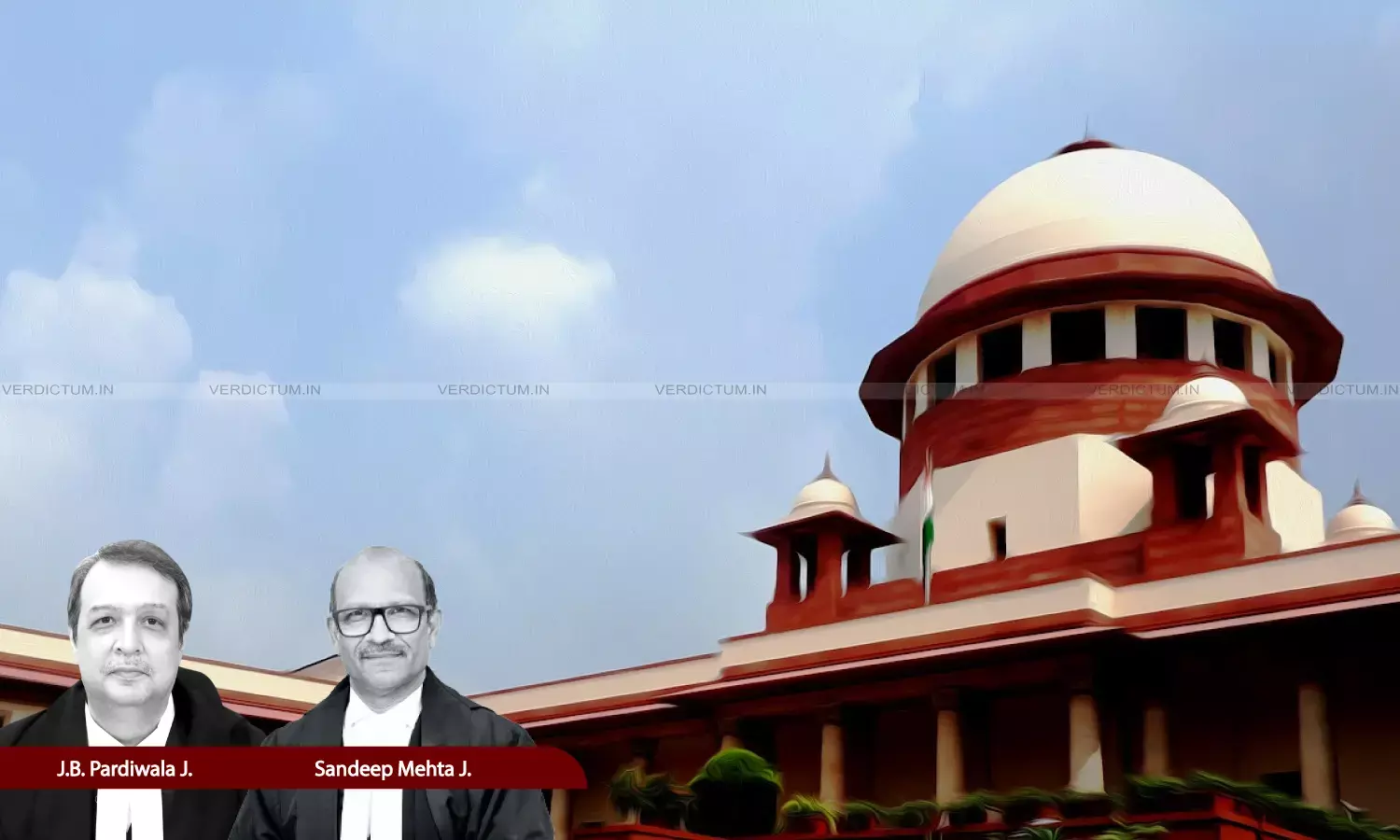No Tax Can Be Imposed By Inference Or Analogy Unless Case Is Covered Within Four Corners Of Taxing Statute Provisions: Supreme Court
The appeal before the Supreme Court arose from the judgment of the Gauhati High Court by which the matter pertaining to Assam General Sales Tax Act, 1993 was remitted to the Assessing Officer.

Justice J.B. Pardiwala, Justice Sandeep Mehta, Supreme Court
While setting aside an order whereby a matter pertaining to the Assam General Sales Tax Act, 1993 was remitted to the Assessing Officer, the Supreme Court has held that if a case is not covered within the four corners of the provisions of the taxing statute, no tax can be imposed by inference or by analogy or by trying to probe into the intentions of the legislature and by considering what was the substance of the matter.
The appeal before the Apex Court arose from the judgment of the Gauhati High Court by which the Order of reassessment passed under the provisions of the Assam General Sales Tax Act, 1993 was set aside and the matter was remitted to the Assessing Officer for fresh consideration.
The Division Bench of Justice J.B. Pardiwala and Justice Sandeep Mehta observed, “In construing fiscal statutes and in determining the liability of a subject to tax one must have regard to the strict letter of law. If the revenue satisfies the court that the case falls strictly within the provisions of the law, the subject can be taxed. If, on the other hand, the case is not covered within the four corners of the provisions of the taxing statute, no tax can be imposed by inference or by analogy or by trying to probe into the intentions of the legislature and by considering what was the substance of the matter.”
Senior Advocate Manish Goswami represented the Appellant while AOR Shuvodeep Roy represented the Respondent.
Arguments
As per the appellant, the assessments undertaken for the years 2003-2004, 2004-2005 and 2005-2006 were time-barred. It was argued that the authority, having regard to the time limit prescribed under Section 19, declared the assessments for all the assessment years to be time-barred. However, later the department obtained the sanction of the Commissioner and invoked Section 21 to bring the fresh assessment within the period of limitation. The petitioner, being dissatisfied with the fresh assessment, challenged the same before the High Court, but the same was dismissed. Aggrieved thereby, the appellant approached the Apex Court.
Reasoning
Referring to section 21 of the 1993 Act, the Bench explained that in cases where no assessment has been made under any of the provisions within the time limits specified in Section 19, then, notwithstanding anything contained in that Section the assessment would be permissible within four years from the date of expiry of the limitation period with prior sanction from the Commissioner.
On a perusal of the facts of the case, the Bench noticed that the assessments undertaken for the three years were already held to be invalid because of being time-barred, in view of Section 19. As per the Bench, later, by virtue of obtaining sanction from the Commissioner, the revenue could not have taken recourse to Section 21 of the Act to say that the reassessment within four years was permissible with prior sanction from the Commissioner. “Section 21 would apply only in cases where no assessment has been made under any of the provisions of the Act within the time limits specified in Section 19. The interpretation of the two provisions of the Act at the end of the High Court is completely incorrect”, it mentioned.
The Bench thus allowed the appeals and set aside the common judgment and order passed by the High Court.
Cause Title: M/s. Shiv Steels v. The State of Assam (Neutral Citation: 2025 INSC 1126)
Appearance
Appellant: Senior Advocate Manish Goswami, AOR Rameshwar Prasad Goyal, Advocate Gaurav Shukla
Respondent: AOR Shuvodeep Roy, Sr. A.A.G. Chinmoy Pradip Sharma, Advocates Irfan Hasieb, Vijay Deora, Aditya Agarwal

